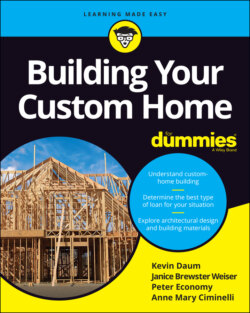Читать книгу Building Your Custom Home For Dummies - Peter Economy - Страница 41
Evaluating a contractor’s three Cs: Cost, craftsmanship, and compatibility
ОглавлениеDo you want a quick and easy guide to help you pick the right contractor? (Yes, of course you do, because you’re reading a For Dummies book!) One way to make the choice is by examining the three Cs: cost, craftsmanship, and compatibility.
Cost: This one is obvious, and although it’s important, it probably weighs the least in your decision-making process. The cost comparison becomes plain when the contractors return the bids. If you’ve handed them complete, detailed plans and specs, you get a clear picture of who’s working on the lowest margin or who has access to the least expensive labor and materials.
Craftsmanship: This part is important in the long term. You want to know that the house is built well and will offer you decades of enjoyable living. Don’t confuse style and design with craftsmanship. A house can have a horrible floor plan with fantastic artisan work, or vice versa.What’s the best way to check on work quality? Look at other houses that the contractor built. Ask the contractor for a complete address list of homes they’ve built, in addition to a list of references. Make sure you look at houses built ten years ago, as well as newer ones. Remember: Just as a car with 50,000 miles drives much differently than a new car, an older home lives much differently than a new one. Don’t forget to talk to the people living in the houses to find out what problems, if any, they’ve experienced with their homes. Don’t be afraid to knock on the doors of homes built by the contractor that weren’t on the reference list. Also, don’t forget to ask the contractor about their workmanship warranties. Warranties usually last for ten years, but they can vary. (See Chapter 17 for more on contractor warranties.)
Compatibility: This one is the most important aspect to consider and yet the most difficult to identify. The hard part is first assessing who you are so you can pick the contractor who will work best with your style. For example, if you’re a micromanager who plans on being involved in every aspect of the project, you’ll constantly butt heads with a contractor who also likes to micromanage their projects. You need a more relaxed contractor willing to let you make the decisions or second-guess their work. On the other hand, if you don’t have the time to be involved in the management, someone with a relaxed attitude probably won’t give you the sense of security you need — particularly if they’re waiting for you to make decisions every day. Figure out what sort of experience will make you happiest, and find the contractor who can meet your needs.
References from people you know are great, but people have different tastes and perspectives on quality and experience. Ask specific, open-ended questions about the experience that can paint you a clear picture of the contractor’s personality. Just hearing that it was a good experience doesn’t tell you much without knowing the reasons why.
